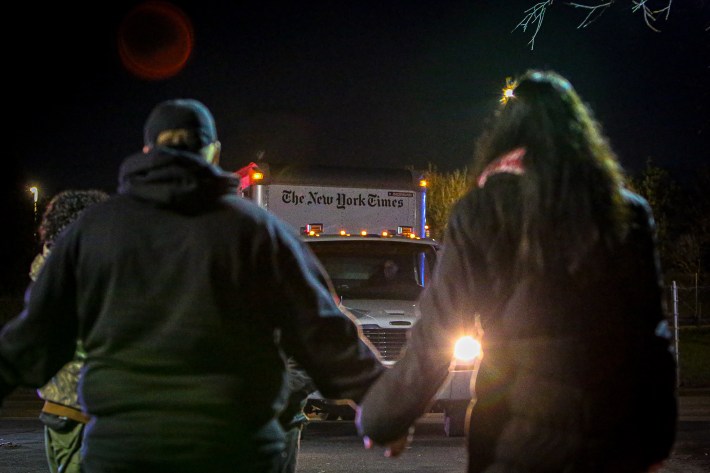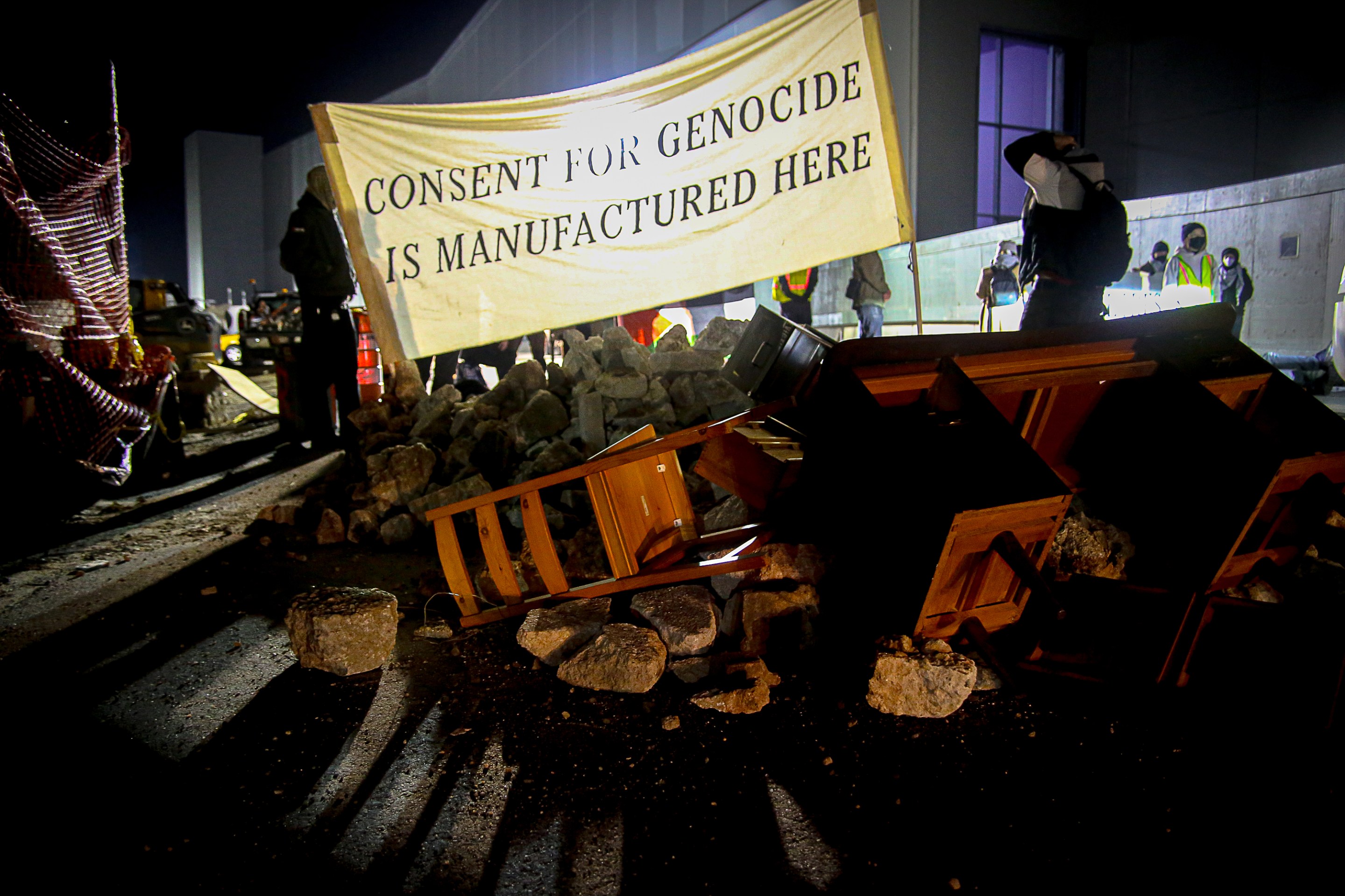Just before midnight on Wednesday, a caravan of cars, vans, and pickup trucks rolled out of a strip mall parking lot in northern Queens and made the short journey to the massive New York Times Distribution Center that looms over the Whitestone Expressway. The vehicles were filled with protesters angry at the New York Times's coverage of Israel's war in Gaza. Their goal this evening was to block delivery trucks from entering or leaving the paper's printing plant in College Point, Queens.
The action, organized by the group Writers Against the War on Gaza (WAWOG), in concert with other groups and individuals, was planned for several months, and represents an escalation of tactics by the paper's critics, even as reports of internal disagreement over the paper's coverage, revelations of serious flaws in its reporting, and complaints about a racially targeted leak investigation all speak to an unprecedented level of tumult and disagreement inside the Times. (Full disclosure: I signed the WAWOG statement of solidarity posted on October 26, 2023, but that is the extent of my relationship with the organization.)
The blockade was also timed to coincide with the launch of a new website, the New York War Crimes, focusing critiques of the the Times's coverage of Palestine and situating it in what WAWOG understands as a long history of the paper's editorial support for U.S. empire.
"We're trying to take the Times out of circulation for a day," Harry, a participant in the action who did not want to give his full name for fear of professional consequences, told me shortly before setting off for the action Wednesday night. "People view it as this repository of objective knowledge, but it's actually at the forefront of manufacturing consent for this war. We want to challenge that, and create a vacuum where other things are possible." In a statement, Times spokesperson Nicole Taylor wrote, "The Israel-Hamas war is a complex and challenging story, and we receive criticism from each side. We are open to good-faith disagreement but firmly reject any assertion that our coverage displays bias."
The caravan arrived, and in a matter of minutes, scores of people poured out, rushing toward the two access points on either side of the complex. A first wave locked arms, blocking both roadways and making space for a second set of people to lie down in the roadways, their arms linked inside armored boxes designed to make it difficult for police or security officers to pry them apart. A small dump truck reversed up the truck entrance and deposited a load of rubble. Protesters unfurled banners, backlit by floodlights standing over the security booth. "Stop the presses, free Palestine," one read. "Consent for genocide is manufactured here," said another.

By 12:30 a.m., big semi trucks began to back up in the facility's driveway, unable to get in. At the front of the line, the driver for a New York Times truck bearing the paper's slogan, "All the News That's Fit to Print," idled his engine, a long-suffering look on his face. Behind it, delivery trucks waited to pick up copies of the Wall Street Journal and the New York Post, both of which also print at the plant.
The Wall Street Journal driver was visibly irritated. "This is not a positive way to make your point," he said. "Hand out flyers at the mall if you want to convince people. Don't do this. Now I can't do my job."
A night shift worker from another operation down the block strolled over to see what the growing traffic jam was all about. "Oh, that's what's up," he said, when he saw the banners. "I'm Egyptian." Activists explained the goals of their action, and he bumped their fists. "You guys are putting in work!" he said.
Two drivers for New York Post trucks looked on the harshly lit tableau with patient bemusement. "They did this before. Earth Day," one said, referencing a similar action by the climate change activist group Extinction Rebellion in 2022. "The last time they did it, it cost a lot of money."
Several minutes' walk around the printing plant from the main truck entrance, a second team of protesters was blocking the complex's other entrance. This operation was somewhat more complex, because organizers had resolved to let workers' personal cars in and out, seeking to block only delivery trucks. Six people were sprawled across the two lanes of asphalt, their arms linked inside more protective boxes, arranged so as to leave just enough room for a sedan to pass. Other protesters formed a human gate that swung open to allow cars in and out.
Private security officers looked on from the sidelines, speaking quietly into their phones. Close to an hour into the action, the first NYPD officers arrived from the 109th Precinct. "I'm fine with you guys protesting," Sergeant Anthony Millan told the protesters' negotiators. "But this is private property." Might the protesters be willing to relocate to the public sidewalk, he asked? "I'd like to get this area open to trucks." The protesters politely demurred. Millan and his team retreated back to the street to confer.
Another empty Times truck rolled up, and a plant security official asked the protesters if they'd let him in to park "so he can go home to his wife." After a huddle, the protesters agreed, and the truck passed through.
More police arrived, from the 72nd Precinct, the 60th, the 66th, and the 67th, and, around 1:39 a.m., the Strategic Response Group, plastic flex-cuffs clicking on their hips. Ten minutes later, police drones were airborne, red and green lights flashing over the scene, their high-pitched whine barely audible over the sound of the nearby highway. Another five minutes later, a huge camper-sized truck from the NYPD's Emergency Service Unit pulled up the driveway, idling noisily in front of the line of protesters.

"How's everyone feeling?" one of the organizers asked the protesters. Good, came the answer. The people lying in the roadway, their arms hard-locked inside the armored cases were still prepared to be arrested, and to make the NYPD figure out how to safely saw through the pipes to disentangle them, if it meant further delaying the delivery trucks going out with the morning paper. A rumor among the protesters held that if the trucks could be delayed past 2 a.m., the papers wouldn't be delivered by the morning.
At 2 a.m., cops with the Emergency Service Unit sauntered over to give the armored arm cases a cursory once-over. More and more SRG cops were arriving. Things seemed to be coming to a head.
Then—a setback for the protesters. Comrades elsewhere on site reported that some number of delivery trucks—perhaps eight—had made it out after all, using a postern gate the action planners had overlooked in their reconnaissance and neglected to block. More huddles and urgent phone conversations: Was it still worth the arrests and the circular saws in close proximity to tender arm parts if trucks were getting out anyway? How many trucks had gotten out? Many still seemed backed up and unable to leave. Was the action a failure or a success?
The police forced the issue, reading a dispersal order over a sound system. Anyone who stayed was going to be arrested. Slowly, in stages, the protesters retreated to the sidewalk, lugging their heavy pipes. Further down the sidewalk, they saw the gate through which trucks had made their sally, the mud of the lawn churned and streaked across the sidewalk.
With the police slowly tailing them down the sidewalk, the protesters made for their escape vehicles and left the scene. It was 3 a.m. "We expect our subscribers and distribution partners to face minimal disruption," the Times's Taylor told me.
At 3:03 a.m., a press liaison for WAWOG emailed a statement attributed to one of the people who had been lying in the roadway to block the trucks. The New York Times "is not an institution that can perceive itself to be a legitimate target of critique, let alone obstruction," the statement read. "Stopping this paper from getting out, even for a few hours, is a big deal. We are going on the offensive against the sacrosanct liberal notion that the Times coming out every morning is like the sun coming up. We are trying to change the order of the day."
Updated (3/14/24, 11:30 a.m.): This story has been updated to note that the author signed WAWOG's statement of solidarity.





